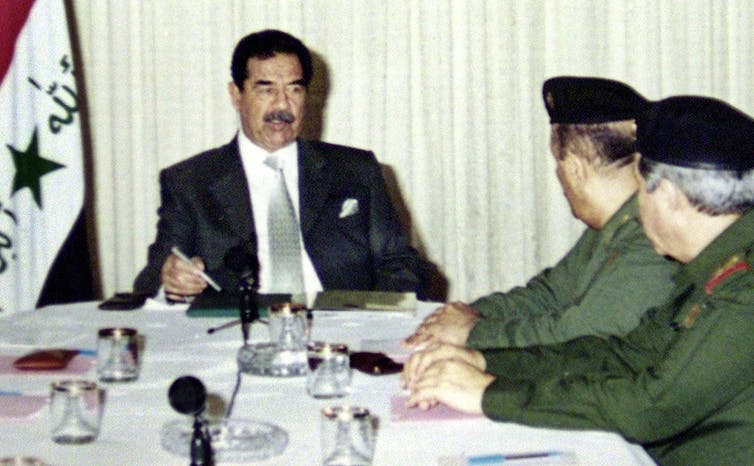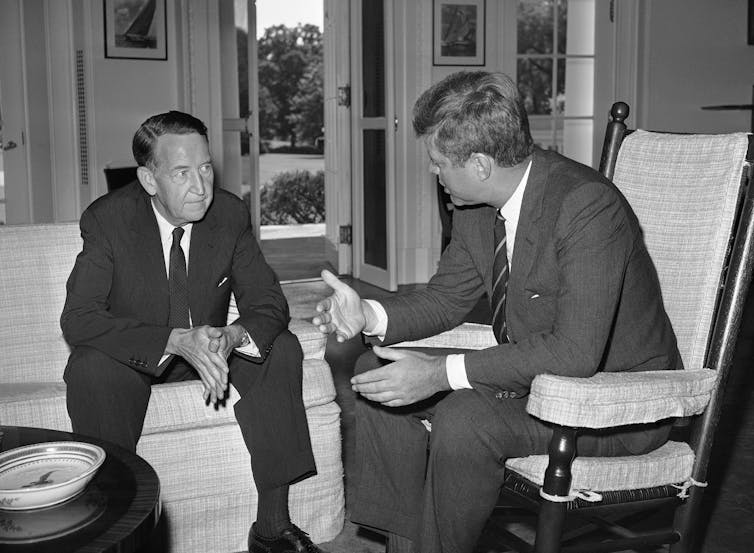What makes Kim Jong Un tick?
- Written by Stephen Benedict Dyson, Associate Professor of Political Science, University of Connecticut
Kim Jong Un is a “smart cookie,” President Donald Trump said[1] of North Korea’s leader in April 2017.
Smart enough, it seems, to merit a face-to-face meeting[2]. President Trump’s acceptance of Kim’s invitation to discuss North Korean denuclearization is a stunning move that some have greeted[3] as a potential breakthrough and others have decried as a massive risk[4].
If he does indeed meet with Kim, Trump will need to understand what makes the North Korean leader tick. Finding the answer to this vital question will require figuring out how the North Korean leader sees the world.
Although Trump will be the first sitting U.S. president to meet with a North Korean leader, he will be far from the first president to try to understand a foreign statesperson. As was the case with figures such as Adolf Hitler, Saddam Hussein, and Nikita Khrushchev, figuring out a dangerous international interlocutor is once again an urgent national security challenge.
Are there lessons from the past that can help President Trump as he prepares to meet Kim?
Lessons of the past
In the spring of 1943, the director of the first centralized U.S. intelligence agency, Colonel William “Wild Bill” Donovan, sought help[5] in understanding Hitler. Donovan wanted to give President Franklin D. Roosevelt a sense of “the things that make him tick.”
Donovan called Walter C. Langer, a psychoanalyst helping with the war effort, in for a meeting, and asked: “What do you make of Hitler? If Hitler is running the show, what kind of a person is he? What are his ambitions?”
Langer combined the scant intelligence on Hitler with insights from Freudian psychoanalysis into a study on Hitler[6]. He accurately predicted that Hitler would commit suicide rather than be captured by Allied forces. But his insight was largely irrelevant to the military strategy for defeating Germany. The report took so long to produce that the war was nearly over by the time it was delivered to Donovan.
 Iraq’s President Saddam Hussein, on left, meets with leading members of his government in August 2002.
Reuters
Iraq’s President Saddam Hussein, on left, meets with leading members of his government in August 2002.
Reuters
More recently, the former top U.N. weapons inspector Charles Duelfer and I studied[7] what made former Iraqi President Saddam Hussein tick. For several years, Duelfer was the senior point of contact between Iraq and the U.S. After the regime fell, he produced the definitive report on its weapon program[8].
Looking for logic in Saddam’s decisions, we found instead a morass of idiosyncratic thinking. Most astonishing was his misreading of President George W. Bush’s June 2002 speech[9] to the West Point Military Academy. Intending to warn Saddam that he must comply with U.N. demands or face war, Bush struck a stern tone. The “gravest danger to freedom,” he said, was “unbalanced dictators with weapons of mass destruction.” Later in the speech, Bush praised President Ronald Reagan for standing up to “the brutality of tyrants.”
What Bush said and what Saddam heard were two very different things[10].
Saddam did not see himself as unbalanced, and he knew that he did not have weapons of mass destruction. And U.S.-Iraq relations had been excellent under President Reagan, Saddam recalled. The United States had tilted toward his side during the Iran-Iraq war. Things started to deteriorate only under the Bushes, in his view.
Our analysis showed that Saddam believed Bush could not have been talking about him. Instead, Saddam concluded he must have been threatening North Korea, not Iraq. Kim Jong Il, father of Kim Jong Un, possessed the nuclear weapons that the Iraqi president desired but did not have.
Bush was dumbfounded by the lack of Saddam’s response to his threats. Later he asked[11], “How much clearer could I have been?”
Duelfer and I had the academic luxury of malleable deadlines in studying Saddam. Langer spent many months on his Hitler study. Scholarship on Kim Jong Un may be too slow for the current crisis.
Major American decision-makers may instead need to rely on their intuition.
Empathize with your enemy
Former Secretary of Defense Robert S. McNamara spoke about intuition in a 2003 documentary[12] about his role in the Kennedy and Johnson administrations. McNamara revealed crucial new details about the 1962 Cuban missile crisis. Soviet leader Nikita Khrushchev had smuggled nuclear missiles into Cuba, threatening 90 million Americans. President John F. Kennedy’s first reaction was that he must destroy them with a massive air strike. This would have courted war with the USSR.
 President John Kennedy and Llewellyn Thompson discussing the Berlin crisis in August 1962.
AP Photo
President John Kennedy and Llewellyn Thompson discussing the Berlin crisis in August 1962.
AP Photo
Seeking the widest possible range of advice, Kennedy asked Llewellyn “Tommy” Thompson, former U.S. ambassador to the Soviet Union, to supplement his foreign policy team during the crisis. Thompson had come to know Khrushchev well and had stayed at his house in Moscow.
“Mr. President, you’re wrong,” McNamara recalls Thompson saying of the air strike plans. “I think Khrushchev’s gotten himself in one hell of a fix.” The former ambassador knew that Khrushchev could be impulsive and later regretful. He imagined a terrified Khrushchev, in awe of the events he had set in motion. Thompson suggested that Kennedy help the Soviet leader find his way out of the crisis. Kennedy decided on a naval blockade rather than an air strike, and Khrushchev backed down.
The lesson McNamara drew? Empathize with your enemy, and intuit how the world looks to them. “We must try to put ourselves in their skin, and look at ourselves through their eyes,” he said.
Turning to today’s crisis, Trump will have to reckon with several uncomfortable facts. The Kim dynasty has invested decades of effort in their pursuit of nuclear weapons; it is unlikely that they will negotiate them away. Further, Trump must recognize that by meeting with Kim, he is giving the North Koreans something they have long sought[13]: to be dealt with as diplomatic equals.
With the president’s dearest hope off the table, and with the meeting itself already representing a win for the North Koreans, what is it that Trump can realistically expect to gain from talks? He and his staff will have to think about how they might cajole and persuade Kim to agree to things the U.S. values, such as a permanent freeze on further missile and nuclear tests.
History tells us that to influence Kim, we must empathize (note: not sympathize) with him. If the meeting is to be a success, Trump and his advisers must first understand how we look to the North Korean leader, peering at us from his very particular vantage point.
This is an updated version of a story originally published on May 4, 2017[14].
References
- ^ said (www.bbc.com)
- ^ a face-to-face meeting (www.nytimes.com)
- ^ some have greeted (twitter.com)
- ^ massive risk (twitter.com)
- ^ sought help (www.tandfonline.com)
- ^ study on Hitler (books.google.com)
- ^ U.N. weapons inspector Charles Duelfer and I studied (www.mitpressjournals.org)
- ^ report on its weapon program (www.cia.gov)
- ^ President George W. Bush’s June 2002 speech (georgewbush-whitehouse.archives.gov)
- ^ two very different things (www.mitpressjournals.org)
- ^ he asked (books.google.com)
- ^ documentary (www.youtube.com)
- ^ something they have long sought (twitter.com)
- ^ published on May 4, 2017 (theconversation.com)
Authors: Stephen Benedict Dyson, Associate Professor of Political Science, University of Connecticut
Read more http://theconversation.com/what-makes-kim-jong-un-tick-93166

